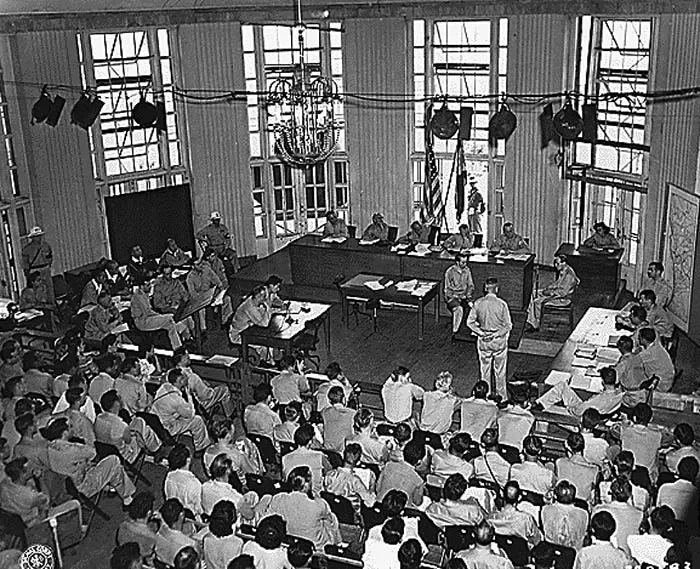Testimony of Corazon A. Burgos on Japanese Atrocities Committed in Tanauan, Batangas in 1945
[TRANSCRIPTION]
This page contains the testimony of Corazon A. Burgos on Japanese atrocities committed in the town of Tanauan, Batangas in 1945. The pages contained herein are now declassified and were part of compiled documentation1 of war crimes trials conducted by the United States Military Commission after the conclusion of World War II. This transcription has been corrected for grammar where necessary by Batangas History, Culture and Folklore. The pagination is as it was contained in the original document for citation purposes.
[p. 2181]
CORAZON A. BURGOS
called as witness on behalf of the Prosecution, being first duly sworn, was examined and testified through Interpreter Rodas as follows, with Interpreter Dionisio acting as “check” interpreter:
DIRECT EXAMINATION
Q (By Captain Pace) Give your name, please.
A Corazon A. Burgos
A Corazon A. Burgos
CAPTAIN PACE: Testify in Tagalog to the interpreter.
Q (By Captain Pace) Where do you live?
THE WITNESS: I speak English.
(The question was translated to the witness by the interpreter.)
[p. 2182]
A (Through the Interpreter) I live in the town of Tanauan, Batangas.
Q How old are you?
A I am 17 years old.
Q How old were you on February 10, 1945?
A 16 years.
Q Will you tell what happened in the morning of February 10, 1945?
A In the morning of February 10, 1945, eleven Japanese accompanied by a Japanese officer went up our house.
Q What did they do in your house?
A They knocked at our door, and they forced us to open the door and they all went in.
Q Did they take your mother and sister out of the house?
A No, they were taken to our yard.
Q What happened to you after your mother and sister were taken to the yard?
A Before they took my sister and my mother into our yard, first they slapped and kicked my sister.
Q What happened to you?
A When they were already down, one officer was left inside the house. He began to slap me, and then point his bayonet on my stomach.
Q What did he do, then?
A After they [he] had slapped me, I was raped.
Q By the Japanese officer?
A Yes.
Q Now, did you see your mother and sister after that?
Q How old are you?
A I am 17 years old.
Q How old were you on February 10, 1945?
A 16 years.
Q Will you tell what happened in the morning of February 10, 1945?
A In the morning of February 10, 1945, eleven Japanese accompanied by a Japanese officer went up our house.
Q What did they do in your house?
A They knocked at our door, and they forced us to open the door and they all went in.
Q Did they take your mother and sister out of the house?
A No, they were taken to our yard.
Q What happened to you after your mother and sister were taken to the yard?
A Before they took my sister and my mother into our yard, first they slapped and kicked my sister.
Q What happened to you?
A When they were already down, one officer was left inside the house. He began to slap me, and then point his bayonet on my stomach.
Q What did he do, then?
A After they [he] had slapped me, I was raped.
Q By the Japanese officer?
A Yes.
Q Now, did you see your mother and sister after that?
[p. 2183]
A No more.
Q Did you see their bodies?
A After I came from the hideout, from the dugout, I saw their bones.
Q What happened to them?
A When I saw them, my mother had got a hole in her skull, by my sister — I don’t know what happened to her.
Q Did you see their bodies?
A After I came from the hideout, from the dugout, I saw their bones.
Q What happened to them?
A When I saw them, my mother had got a hole in her skull, by my sister — I don’t know what happened to her.
CAPTAIN PACE: You may cross examine.
CAPTAIN SANDBERG: No questions.
(Witness excused.)
Notes & References:
1 “Excerpts from the Testimony of Corazon A. Burgos in U.S.A. v Tomoyuki Yamashita,” part of the U.S. Military Commission compilation of war crimes documentation, online at the Internet Archive.

